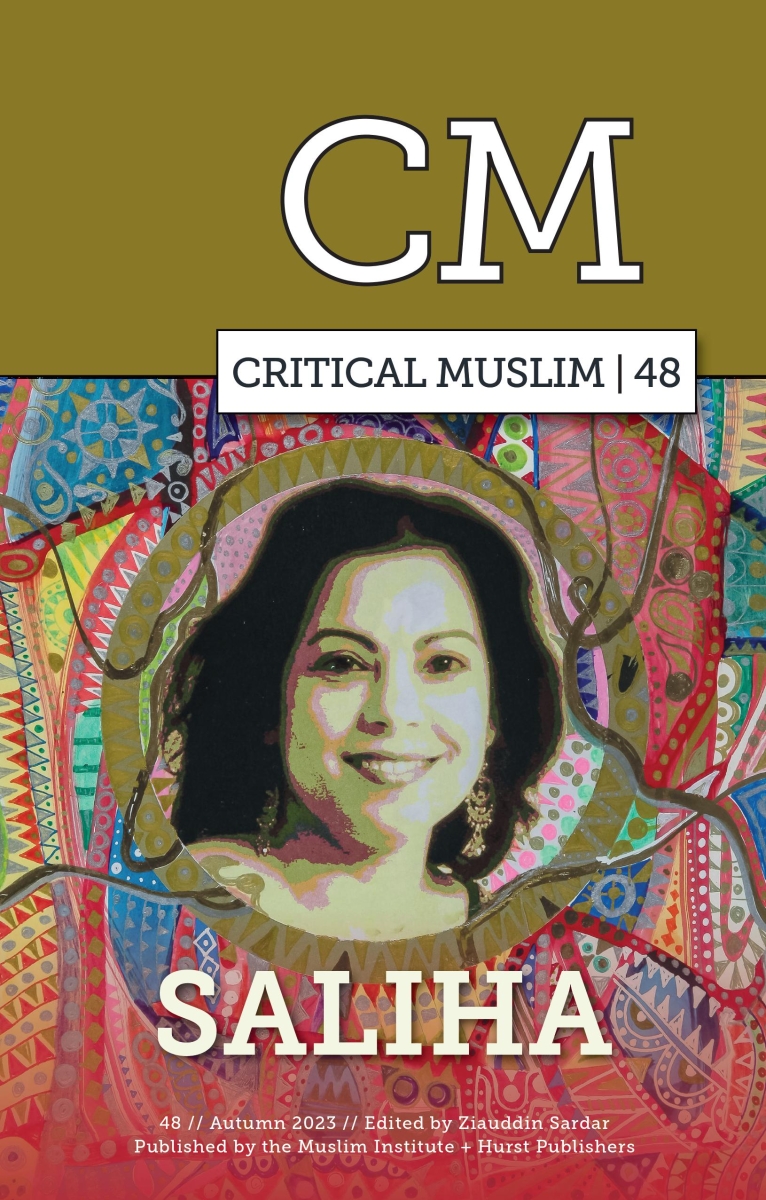
A special Critical Muslim public event took place on 18 January 2024 at the Arts Workers Guild, Bloomsbury, London. The event launched CM 48: Saliha and served as a memorial to Saliha Sardar, with readings from the contributors to the issue as well as tribute to a virtuous life well lived. The event was organised by the Muslim Institute.
Full video of the event with subtitles
The evening memorial hosted approximately eighty guests seated in the main hall of the Guild, where they were gifted with a complimentary copy of CM48: Saliha. The proceedings began with Muslim Institute Director Hassan Mahamdallie addressing the gathering:
Critical Muslim 48 Saliha is dedicated to the memory of Saliha Sardar, who died suddenly in January of last year. This gathering is a remembrance of a virtuous life well lived. And I think everybody who knew her would agree that Saliha characterized virtue impeccably. We will hear readings from contributors to this special issue of Critical Muslim, as well as tributes from family and friends of Saliha. The Quranic term Saliha signifies a person who is righteous, pious and unfailingly does good deeds, virtues that Saliha without doubt embodied.
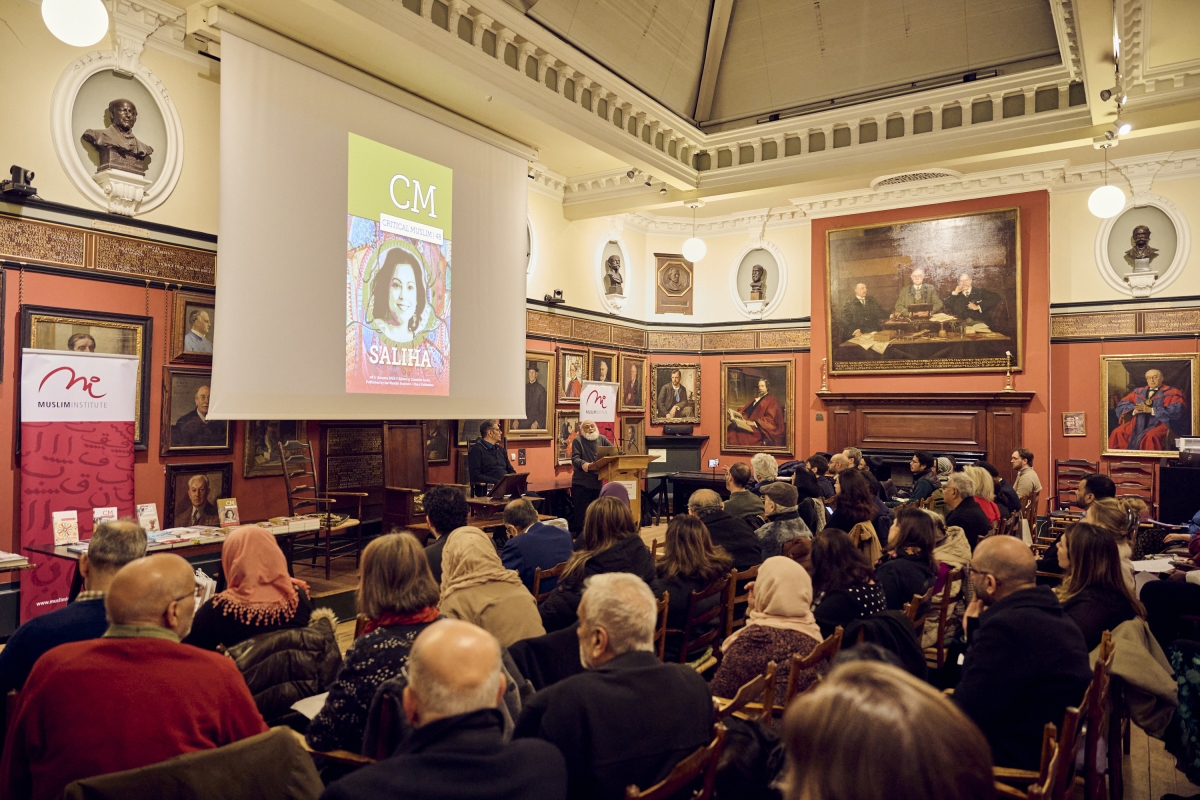
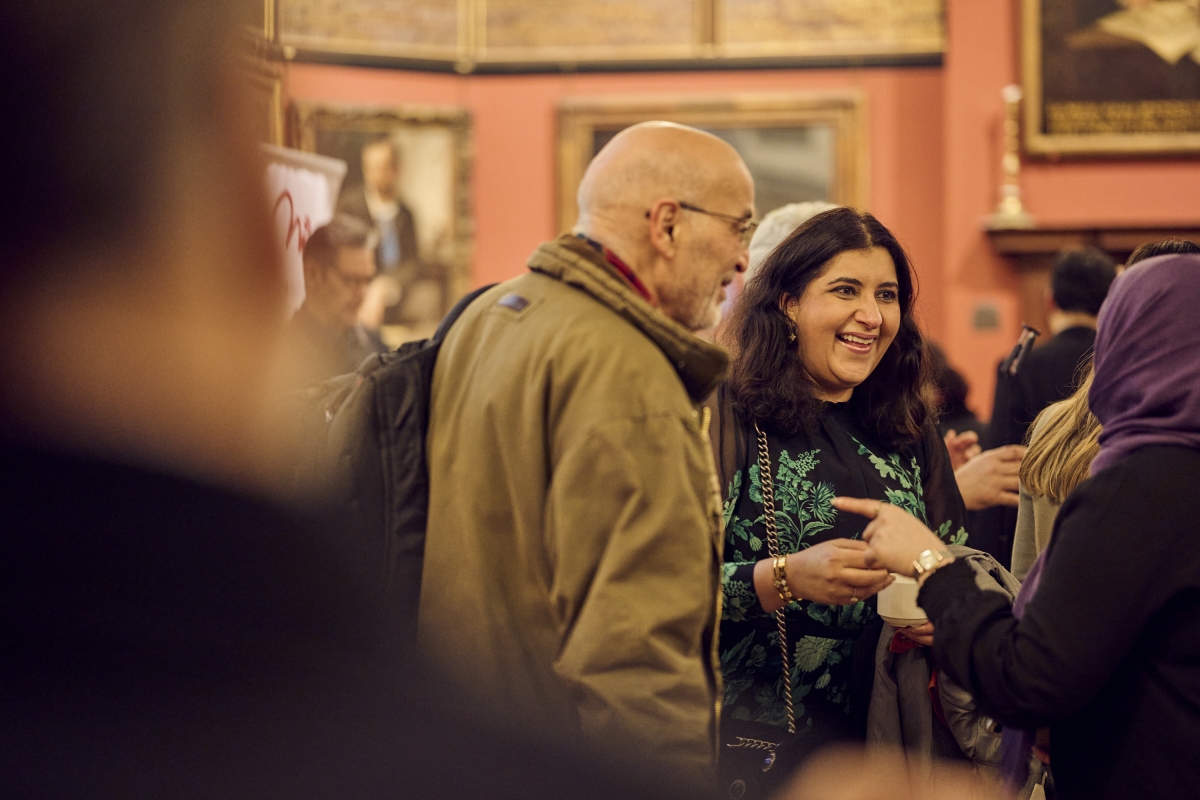
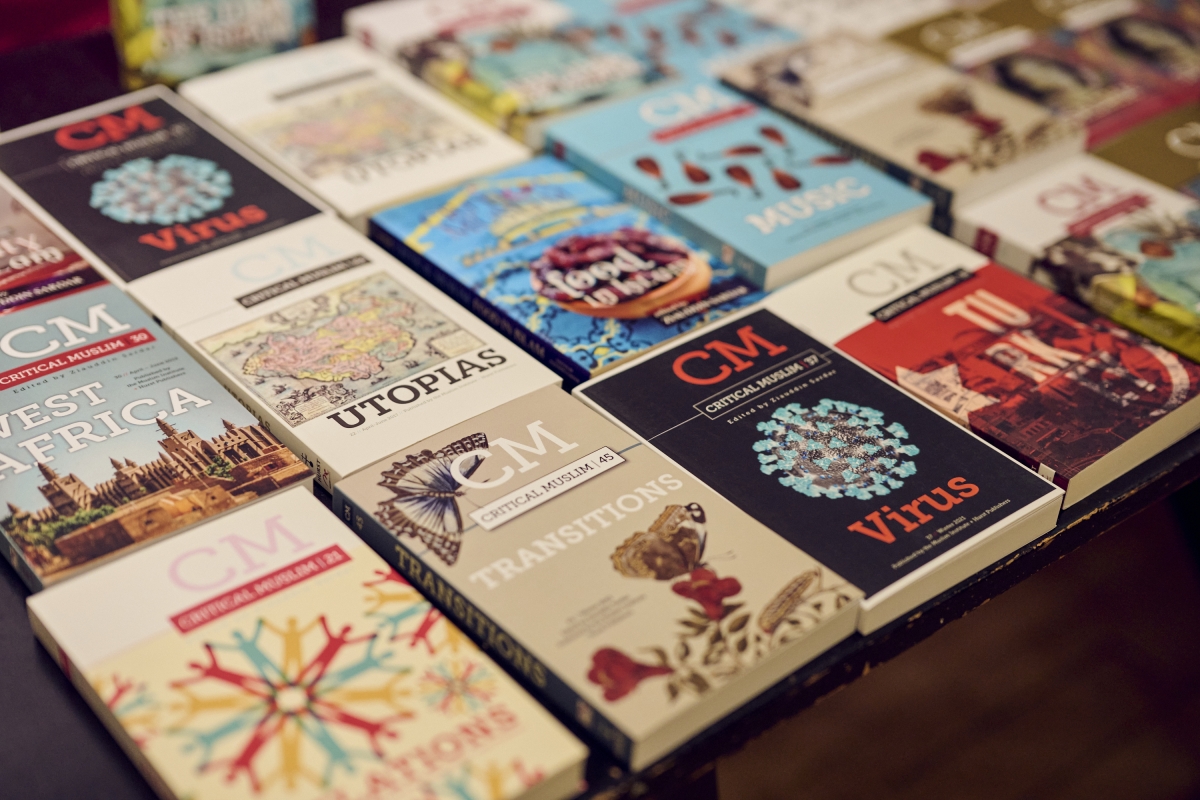
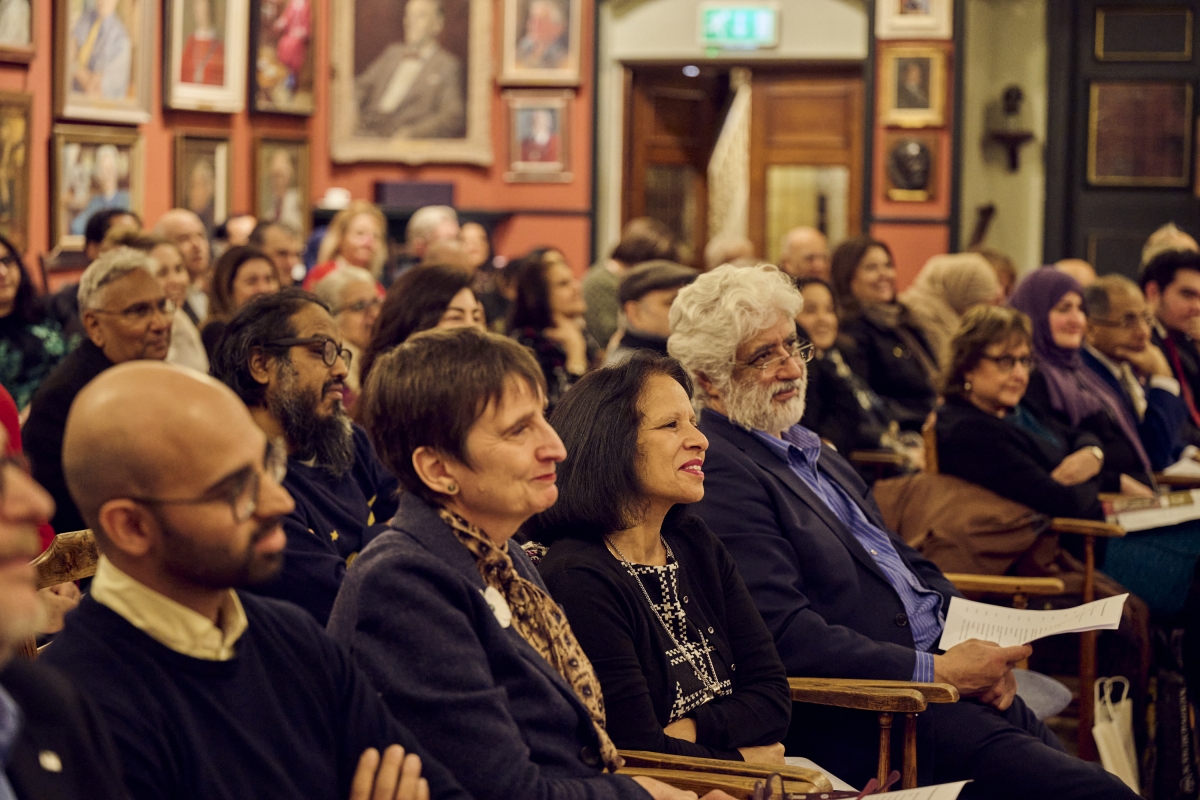
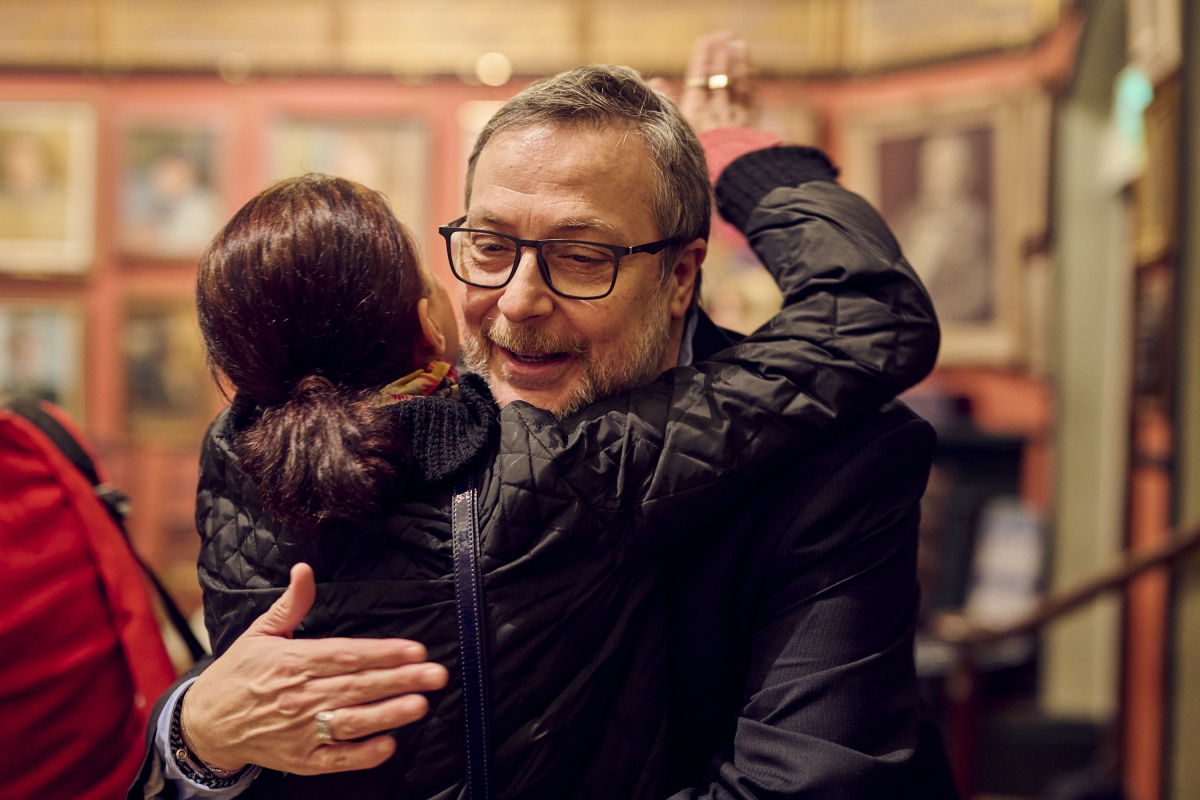
Mahamdallie introduced the speakers one by one, starting with Dr. Khaled Siddiqui, the brother-in-law of Zia Sardar. Dr. Siddiqui then gave his dua and spoke on Saliha:
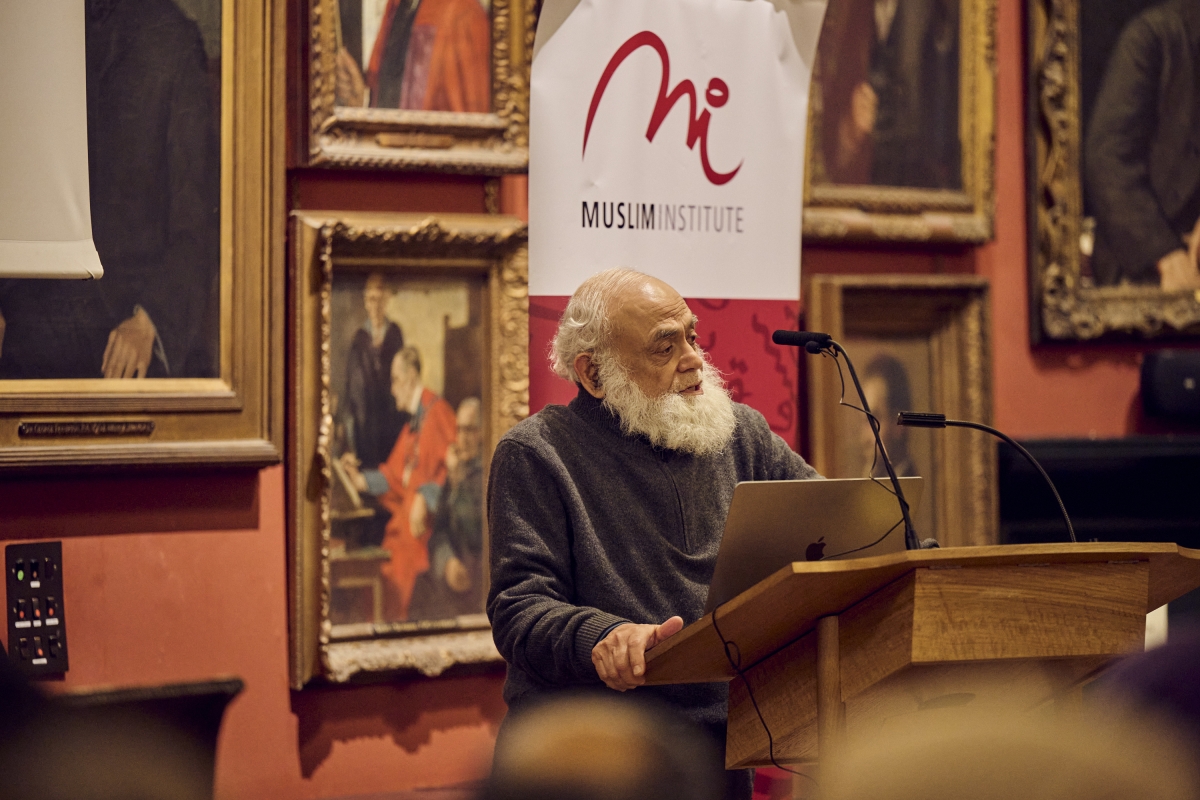
Saliha Sardar was committed to her family. Because no charities begin outside your family. It begins with yourself, with your family members, and then you move forward. What I have seen with her are three things. First commitment to the family. And she was able to offer all the sacrifices of being a mother. We all believe that she reached the level where we can say that under her feet lies the garden of paradise for her children.
Saliha my sister, my brother Zia's wife, left us in a very short period of time. But she also left a very long and deep impact on the people who are left behind. Whether they are family, relatives, or coworkers, neighbours, anybody she was meeting, she was touching them with her compassion, with her love, with her sympathies. She touched each and every one of you, in addition to me and my family. In my view if you are loved by your friends in addition to the family and everybody else, you have fulfilled the purpose of your life. And the purpose of your life is to be the most kind, helpful member of the human society, and uniting with other people's efforts, finding the grounds where we can cooperate with each other. I think she left a very good example to be followed”
Following Dr. Siddiqui, Robin Yassin-Kassab, deputy editor of Critical Muslim, read from the essay ‘Saliha’ in CM 48:
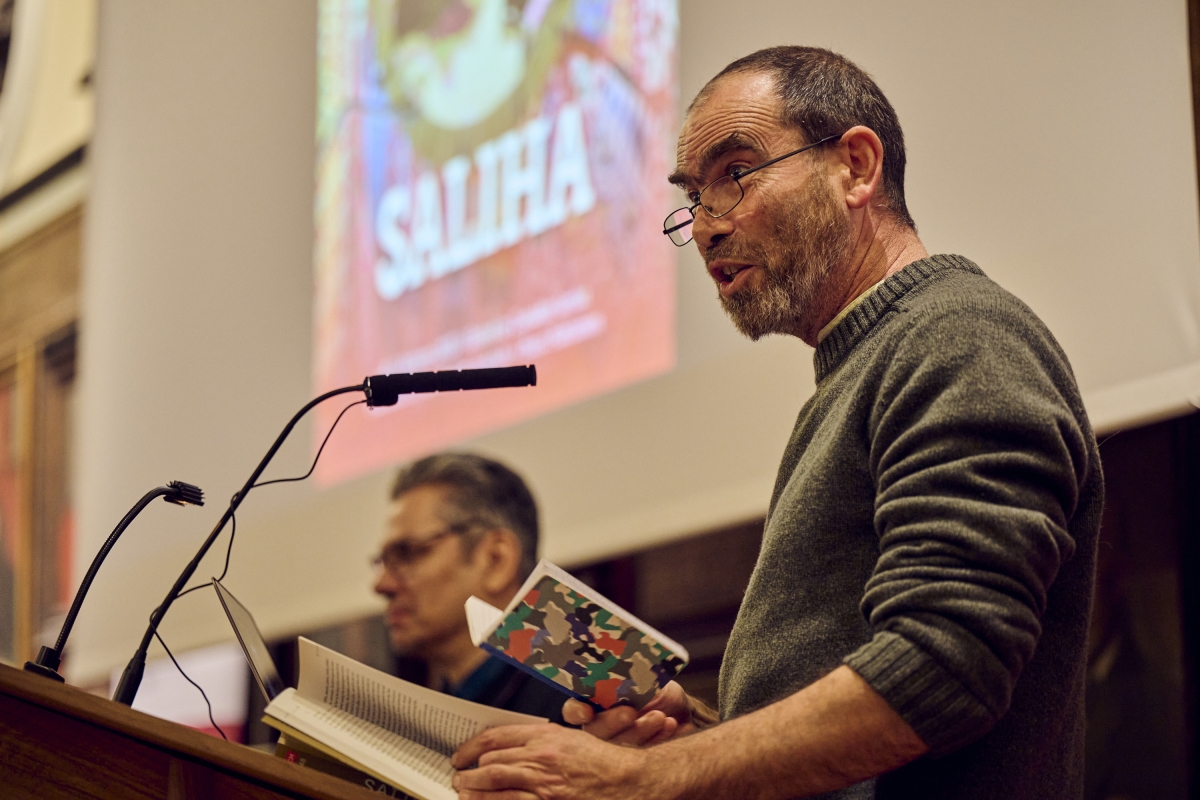
This is a sad occasion but it also a celebration, I think of a great life. And it's also a celebration of a really good issue of Critical Muslim. The longest essay in this issue of Critical Muslim, and a really strong essay is by Zia. Once I started reading it, I literally couldn't stop. It's really gripping stuff. I think it was quite painful for him to write. And it was worthwhile because it's a great piece. So I will read bits of it, but I do recommend you read it all.
First, just a paragraph from the beginning section. Zia speaking:
I tended to be wrapped in myself. I suspect that most writers are. I needed time and space to write and had to travel for research. But Saliha came to appreciate this. When people asked me how I had managed to write so many books, I always replied: it’s thanks to my supportive wife. In one respect, she is the invisible but ever present co-author of all my works, and she actually features in a few. When someone visited our house, she would point, with a beaming smile on her face, to the bookshelf that held most of my titles: ‘my husband wrote these’. However, she seldom agreed with what I had to say.
Before I go on to the next bit, we are also celebrating Saliha and Zia. Both of them. We're celebrating a relationship. And human beings people really do their best stuff and their worst stuff in relationships. Relationships with other people tend to magnify or amplify what we're doing. It's only with in cooperation with other people that we can do terrible things like genocide. And it's only in cooperation with other people, we can do really wonderful things. Saliha's the basis of this relationship, this family, this couple who produced all of these books, this great big chain of books and television programmes and talks and interactions and Critical Muslim. It's because of this relationship between both of them that we're all here today.
I will now read from near the beginning of the essay:
‘Meri jaan’.
That’s what I called her. When she was anxious or concerned about something: meri jaan, my life, my love. I would put my arms around her. She was not a natural hugger. Her first reaction would be to hold back. But once I clasped and held her firmly, she would calm down; her worries would melt away. We would become one. A single life. Usually, she was Begum. It was, as I was eventually to discover, part of her name. Her birth certificate has her name as ‘Saliha Begum’.
It is an honorific given to Muslim women of high social or cultural standing in South Asia. Sometimes it is just added to the first name without a solid reason. In Saliha’s family there are many Begums. Her mother and aunts are Begums. But by the time she got married, and had Sardar added to her name, Begum had been dropped. Her first passport, issued in Multan, Pakistan, on 27 December 1977, has Saliha Basit (her father’s name) written underneath her photograph in blue ink, with Sardar added in black, as though an afterthought. But I called her Begum: she was my Begum, my queen, my wife, my beloved, who elevated my position, gave honour and dignity to my life.
My nephews and nieces, and some younger members of our extended family, called her ‘Dulhan’ – Bride. When we were getting married, my nephew, Atif, who was two years old, asked: who is the woman sitting on the podium, wrapped in red garments. She is the Dulhan, he was told. He, and other children present at the wedding, started to call her Dulhan. The appellation stuck. But she was appropriately named, and was always Saliha – the virtuous one. It is a Qur’anic term that also means righteous, pious and just. In its different forms, the word occurs a hundred times in ninety-eight verses of the Qur’an. Saliha personified righteousness. She was, according to the Qur’an, one who ‘does righteous deeds and has faith’ (16:97). For her, wealth and consumerism were nothing more than ‘allurements of the life of this world’. She was interested in ‘the things that endure’ (18: 46). ‘Things that endure’ were the virtues that were deeply engrained in her. She embodied what in Muslim history and circles is called akhlaq, the ‘character traits’ that define a virtuous person.
These virtues are spelled out in the Qur’an: humility, sincerity, patience, modesty, prudence, forgiveness, courage, love, and justice. She did not acquire these virtues. They were infused within her by the Grace of God, and enhanced by her upbringing, by the traditional setting of her family background, and by her own conscientious personality.
This is Zia when some time after Saliha's death, he's been away. He's come back home, he's noticed that the weeds in the front garden, which she always used to get rid of have not been got rid of and he breaks down:
It took a little while for me to compose myself. Eventually, I opened the door, and went inside the house. I threw my luggage in the doorway, and sat in the living room. The house was truly empty for the first time. She was not there; there was no ‘Aa Gai’, no loving embrace, no murmurs of jani. I could hear nothing. I could see nothing. I yearned for her voice. I longed to see her radiant face. I felt a haunting sense of incompleteness – exposed, as though I had been skinned, my body was just bones and flesh without the protective layer of the skin. The protective layer was always at our home, the fulcrum of my life. That is where I found myself and my body united with my skin, my soul with my being. But our home for over forty years did not feel like a home. It was just a house. How can the body survive without the skin? How would I survive separated from my soul mate? There was an absence, an eternal absence that I could not bear.
I wept uncontrollably. After some time, I managed to get up, climb the stairs to our bedroom, and throw myself on the bed. I fell asleep, or rather drifted into a state of suspension, somewhere between asleep and being conscious of my surroundings. I heard a movement. I thought it was the rattling of internal doors, and ignored it. Moments later, I heard another rustling sound. Then I felt as though someone had sat at the end of the bed. I looked up in fear. But my fear evaporated instantly as I gazed at the serene face of my Begum. She was looking and smiling at me. My Dulhan, swathed in garments like the day she married me. But not in red. She was covered with a soft white blanket that my sister had brought for her when she was going through her cancer treatment. I got up to embrace her. As usual, at first she was reluctant; then she threw the blanket around me. The eternal absence transformed into a perpetual presence.
I walked down to the living room, and then all over the house, with Saliha wrapped around me, as though she was a life-enhancing blanket. The two as one. A door was ajar. She turned my grief into grace. Even in death she was concerned about me. In life, she displayed a bundle of virtues to be emulated. She was my life. She is my life. Meri Jaan.
Following Robin’s reading, Michael Dwyer, the publisher of Critical Muslim with Hurst & Co and a friend of the family offered a few words for Saliha:
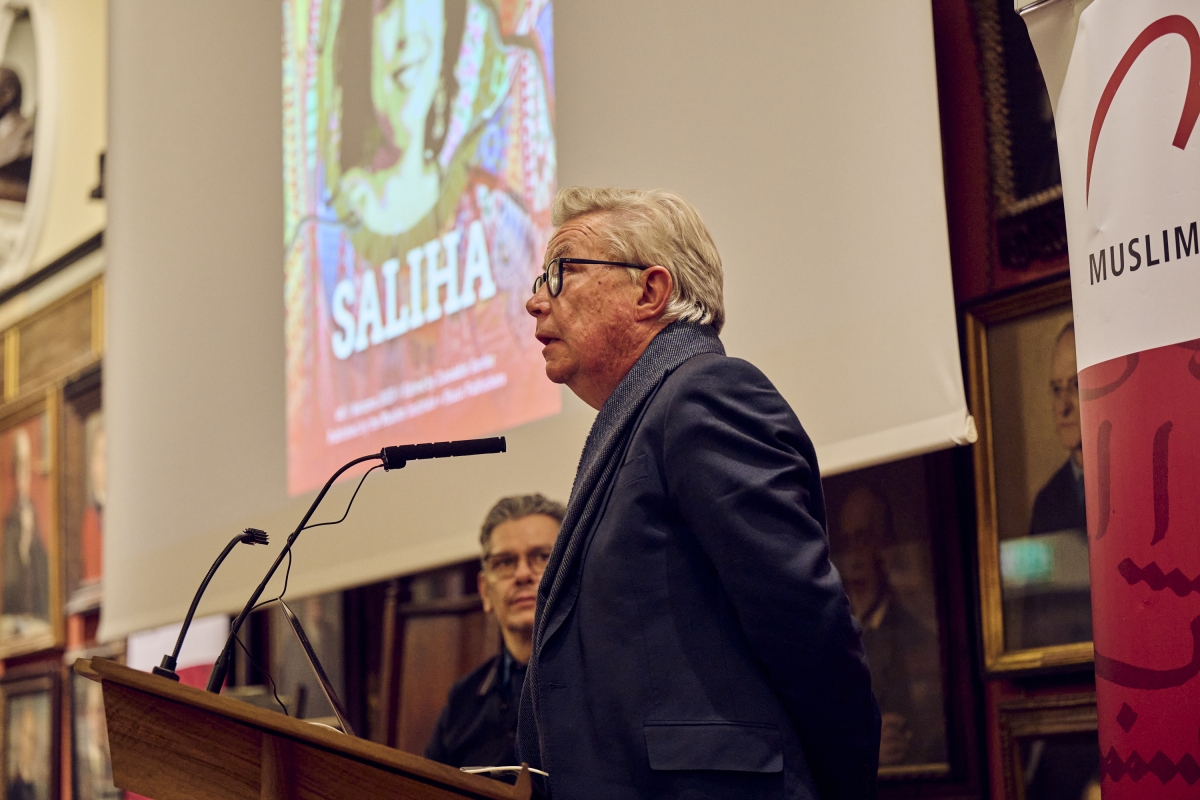
Zia and Begum were dear, dear friends of mine, and her loss is deeply felt and always will be. Let me just begin by saying it’s undeniable that Saliha, whom I always refer to as Begum too as a mark of respect. Begum was Zia’s muse, his inspiration and his vital life source that was immediately apparent whenever they were together. And again, it was a great honour to be in their company.
She was of course an irreplaceable fixture in the Sardar family, the still centre of that bustling world and of the wider Critical Muslim family. A pious and virtuous presence in all of our lives, illuminating the world with a radiant smile and personal warmth. Like many of us here this evening, I was a devotee of her biryani, shammi kebabs, and everything else that appeared effortlessly from her kitchen.
Her militant hospitality (to use a phrase I've heard about the welcome one expects in Pakistani homes, and which I have been lucky to experience in Lahore, Karachi, and of course in Colindale), reflected her graciousness, and her selflessness. My wife especially always looked forward to getting together with her, given their shared interest in Hindi cinema, particularly of the golden era.
Saliha was modest to a fault, just astonishingly modest, such that while I knew that she was a teacher, she never once revealed as I heard from others, how she was held in such high regard by her colleagues and pupils, and about the many pupils lives she touched and changed for the better. Saliha was also, lest we forget, a guiding presence behind the scenes of Critical Muslim since its inception. Without her I doubt very much we would be here today celebrating the publication of number 48 in her honour. Thank you.
Michael Dwyer was followed by Zain Sardar, Saliha's son who spoke on behalf of the Sardar family.
It is a great honour for me, on behalf of the Sardar family, to say a few words in memory of my late mother, who passed away all too soon. I hope I am able to do justice to someone who in life radiated so much warmth; touched so many here today with her infectious spirit; and who has left this world a profoundly poorer place.
I wanted to reflect on some of the characteristic traits, or, perhaps, virtues, that so endeared my mother to her family, friends, colleagues, as well all those who had the pleasure of meeting her across a whole myriad of different communities, including those closely associated with the Muslim Institute and Critical Muslim. I know she always looked forward to the Winter Gathering and other occasions in the Muslim Institute calendar, where she was always eager to catch up with old friends, offer a consoling smile, and lend a sympathetic ear.
My mother’s life – the way she conducted herself – has a lot to teach us all. What grounded her was a strong sense of personal ethics: a guiding ethical orientation which was second nature to her, embodied in service and devotion to others, and manifested through selflessness, patience and a strong, overarching sense of justice.
She was not a larger-than-life personality who will be remembered for making the big interventions. No. She was a life made up of a thousand small kindnesses; for her it was the little gestures that carry the power to make an enormous difference in this world. It is the memory of these kindnesses and gestures that will continue to endure beyond her in the lives of others.
First and foremost, it is important to say that my mother was a great convenor. She excelled in bringing people together and, indeed, she was able to create a community around her wherever she went.
It was this ability that led her to dedicate huge amounts of energy and self-sacrifice to ensure the cohesion of the immediate and extended family, acting as its calming and serene centre of gravity. Many of my own formative memories in my youth provide a portrait of her character in this regard. For instance, I fondly recall my mother’s loving presence by my side as I attended medical check-ups in the aftermath of surgery to correct club foot. I remember trips to Pakistan in which my mother, alone, had to contend with her three children and baggage, all while navigating layovers and Pakistan International Airlines. I also vividly remember the tender moments, such as my mother’s tears as I left home to start my undergraduate degree in Canterbury.
It is very much an understatement to say that the family home could simply not be complete without her. Every time I enter the homestead, I still hear the echo of her voice, to this day, asking whether it is me who has come in.
Very much reflective of her gregarious persona, she made friends easily from all walks of life, particularly from work and the local community. It is no surprise, in that case, that she was happiest surrounded by her family and friends, or entertaining guests. In those circumstances, many have noted the extra twinkle in her eyes and added octave in her voice.
She was an exceedingly selfless individual and in fact, service to others really defined her life. In her interaction with those around her, her patience and generosity – the hallmarks of her personality – would unwaveringly come to the fore. She had that astonishing ability, in the words of Rumi, to ‘look at a thorn and see the rose; to look at the night and see the dawn’.
In her professional life, as a teaching assistant she was strongly committed to caring for the disabled, non-verbal children at the Village School, where she quickly established herself as a favourite amongst staff and students. She held herself to high standards, prided herself in never taking a sick day, and was exceedingly scrupulous in sticking to rules. She can only be described as a model of integrity, and, moreover, it is worth pausing to reflect on what a rare commodity integrity is in current times.
More than anything, however, she cherished every moment with her pupils. Fundamentally, it was the people whom she loved so dearly that kept her going back. Consequently, she never really wanted to retire and was planning to continue working even in her final days.
Throughout her life she was a hugely resilient character, and she dealt with the hardships, including the cancer diagnosis itself, with fortitude and stoicism. But the pain she was able to bear herself she found intolerable in the suffering of other people. She was constantly concerned with those who are decidedly underserved in society. This speaks much of her charitable nature and in this, she has been an inspiration to her children. Our own sense of public service and impulse to advance social progress has been indelibly shaped by our mother’s sensibilities, which will also, undoubtedly, continue to inform our future trajectories.
From focusing on my mother's virtues – in Arabic, ‘Saliha’, I want to turn to another definition of ‘Saliha’. The word can of course refer to a virtuous person, but in its standalone form it means ‘good deed’. As a trustee of a new charity invested in continuing my mother’s life work, it is truly satisfying to know that my mother’s good deeds of assisting vulnerable young people will persist beyond her life.
The Saliha Sardar Trust brings together this community that she built around her, in aid of a cause that she gave her working life to, cementing a legacy in support of the type of special needs children who benefited so enormously from her care and generosity.
To conclude, while my mother’s death represents, for the family and the communities she was devoted to, an irreplaceable loss and void in our lives, we are determined to keep her legacy and generous spirit alive through our own actions.
Thank you.
Following Zain Sardar’s speech, Shiraz Khan delivered a message from Dr. Anas Sheikh Ali, Director of Publications for the International Institute of Islamic Thought (IIIT), and a long-time friend of Zia and Saliha.
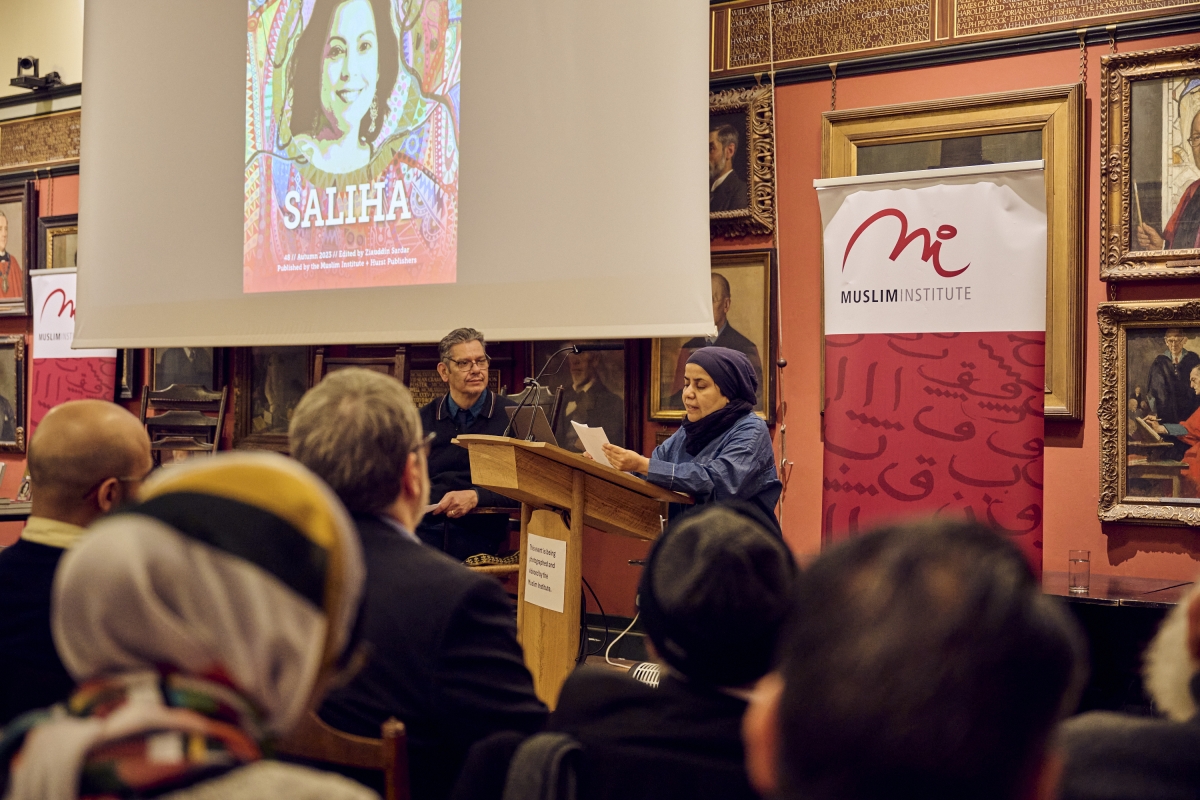
Brothers and sisters. Many of you may know the story of my relationship with Zia. But for those who don't, it goes something like this. For whatever reason, Zia initially held a negative view of relationship with the IIIT. Not surprisingly, therefore, my learning that I was the IIIT’s academic advisor in Europe, Zia took it upon himself to entirely ignore me. Then something interesting happened - Dato Seri Anwar Ibrahim, a dear friend to both of us and the now Prime Minister of Malaysia, visited London. He noticed the coldness between Zia and me, and being an experienced politician tried his best to deal with the issue in a gentle and diplomatic way. This partially worked and we started, albeit reluctantly, to exchange greetings in a stiff and coldly polite manner, whilst maintaining a comfortable distance. Eventually the ice melted completely.
The relationship developed quickly after that, and most important of all paved the way for me to meet the wonderful Saliha - may Allah have mercy on her and grant her Firdous - which I did for the first time when I visited them at their home. I remember I went in with dread expecting a similar cold welcome, thinking Saliha would be distant in manner and in the background, how utterly wrong I was. Saliha was the heart and soul of that home without doubt, she proved to be gentle, warm and welcoming.
The second and much longer encounter with Saliha took place during a 10-day summer school for graduate students, which we organize annually at a friend's farm in Turkey near the Black Sea. Students come from various parts of Turkey and Europe. It was during this time at the farm that I saw Saliha at her best. She charmingly engaged not only with our hosts who she met for the first time, but also especially with the students during breaks and meals, they would swarm around her, enjoying her gentle, warm and motherly attention, as well as enlightened discussions on various issues and life experiences. The hosts loved her and very much appreciated her presence and contributions to the whole experience. Needless to say, they were very sorry to hear of her passing, so much so that they still recall her fondly whenever we meet.
The last time I saw Saliha although I did not know it to be, along with her daughter Maha ,was in Istanbul at a conference for Central Asian scholars. These were the few encounters I had with Saliha but what an impression they left behind one that will be everlasting. She personified dignity and decorum. One of those rare individuals who truly cared would have no airs or graces, was down to earth and compassionate.
In the words of Rumi, who suffered great grief and loss within his own life, I quote, ‘goodbyes are only for those who love with their eyes. Because for those who love with their heart and soul, there is no such thing as separation’.
Following Shiraz Khan’s reading of Dr. Anas Sheikh Ali’s words, Naomi Foyle, poet, fellow of the Muslim Institute and Fiction and Poetry editor of Critical Muslim, read from her own essay in CM 48 about another extraordinary woman:
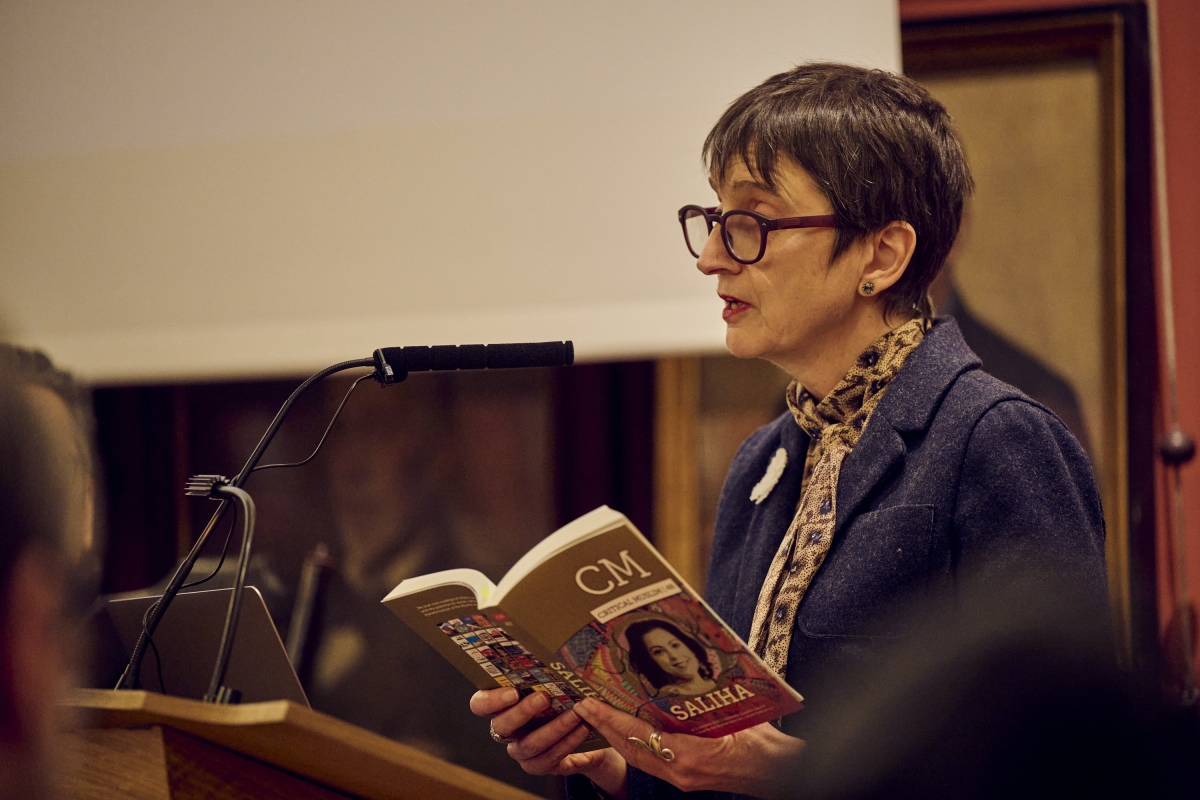
I'm very moved to be here. I met Saliha in Salisbury at the Winter Gathering, but I did not have the pleasure and the honour of knowing her properly. And that's a sadness. I feel even more poignant here tonight, the more that I learn about her. James Joyce wrote that absence is the highest form of presence. It is fitting that I'm reading tonight from my tribute to Shuhada Sadaqat , also known as Sinead O'Connor, who died last year.
I've chosen sections from the beginning and end of the essay, reflecting on the relationship between grief and faith.
‘They tried to bury me. They didn’t realise I was a seed.’ Shuhada’ Sadaqat/Sinéad O’Connor - after Dinos Christianopoulos.
In the dream factory farm of the Western pop music industry, women singer-songwriters with siren voices who are also anti-racist activists, gender non-conformists, emotional lightning rods and fountains of love are golden needles in a haystack. Such a precious needleworker was the Irish musical artist Shuhada’ Sadaqat/Sinéad O’Connor, who reverted to Islam in 2018 but continued to record, publish, and perform under her birth name until her premature death at the age of 56 in July 2023. A global superstar in her early twenties, Sinéad/Shuhada’ (as she was known to sign emails) was never forgiven in some quarters for dramatically rejecting this conventional success, and tributes in the British mainstream media were either lacking or insulting to her memory.
But she knew that her true fans were not starstruck by her phenomenal voice or captivating looks but were ‘on my level’, as she put it in an early interview, people who related to the vulnerability, passion, and political anger she expressed in her work. These fans are legion: on social media her loss provoked an outpouring of grief and a slate of insightful eulogies, mourning the loss of a riveting artist, a powerful voice of protest, a modest and private benefactor to many, a proud single mother, and a courageous role model who spoke openly about her many physical and mental health difficulties. But while much has been said lately about how Shuhada’ Sadaqat used her high profile to shine a light on social and political ills, often well ahead of her time, she has not yet been given enough credit as a theologian.
That neglect is no doubt partly because mainstream journalists do not want or know how to engage with her Muslim beliefs. But also because in a secular, individualist society, a celebrity’s political views and psychological condition are of far more interest than her spiritual beliefs. Sinéad/Shuhada’ spoke out about the vicious abuse she suffered as a child at the hands of her mother, who died in a car accident when the singer was eighteen. At the age of twenty-four, at the height of global fame, she was overnight shunned by the music industry for protesting, on live American television, systemic child abuse in the Catholic church. Having also earlier refused a Grammy, on the grounds that the award was for ‘shifting units’ not artistic merit, she forged a career outside the mainstream, producing eight more highly regarded, if not commercially supersonic albums, enabling her to raise her four children on her own. But it was not an easy road.
And from the end of the essay:
Sadly, Sinéad/Shuhada’ was not a professed Muslim for long enough to integrate her understanding of Islam into her work, but it can be read retrospectively into her constant searching for a merciful and unifying God. For all the evidence, though, of her love of the faith, and lifelong commitment as a seeker, some might call her a spiritual loose cannon, her various changes of religion and name symptoms of a deep psychological instability. Theologian Brenna Moore, argues that this would be a mistake, writing in an eloquent and perceptive eulogy that ‘O’Connor defied religious labels, exploring multiple faiths. The exquisite freedom in her music cannot be disentangled from that something transcendent she was always after’. For Moore, O’Connor/Sadaqat stood in the line of the provocative Judeo-Christian prophets of old, never afraid to raise their voices in defence of holy truths.
To me, her political activism aligns her ‘priesthood of music’ with liberation theology, which, while strongly associated with a Christian movement in Latin America focused on challenging injustice and alleviating socio-economic oppression, also has an Islamic dimension in the African-American Nation of Islam. The fact that the major British TV channels did not mount tributes to Sinéad O’Connor /Shuhada’ Sadaqat after her death is contemptible – but also shows just how threatening her values and beliefs were and are to conventional ideas of success.
Following Naomi Foyle’s reading, Indu Kalaria, close friend and confidant of Saliha stood to speak:
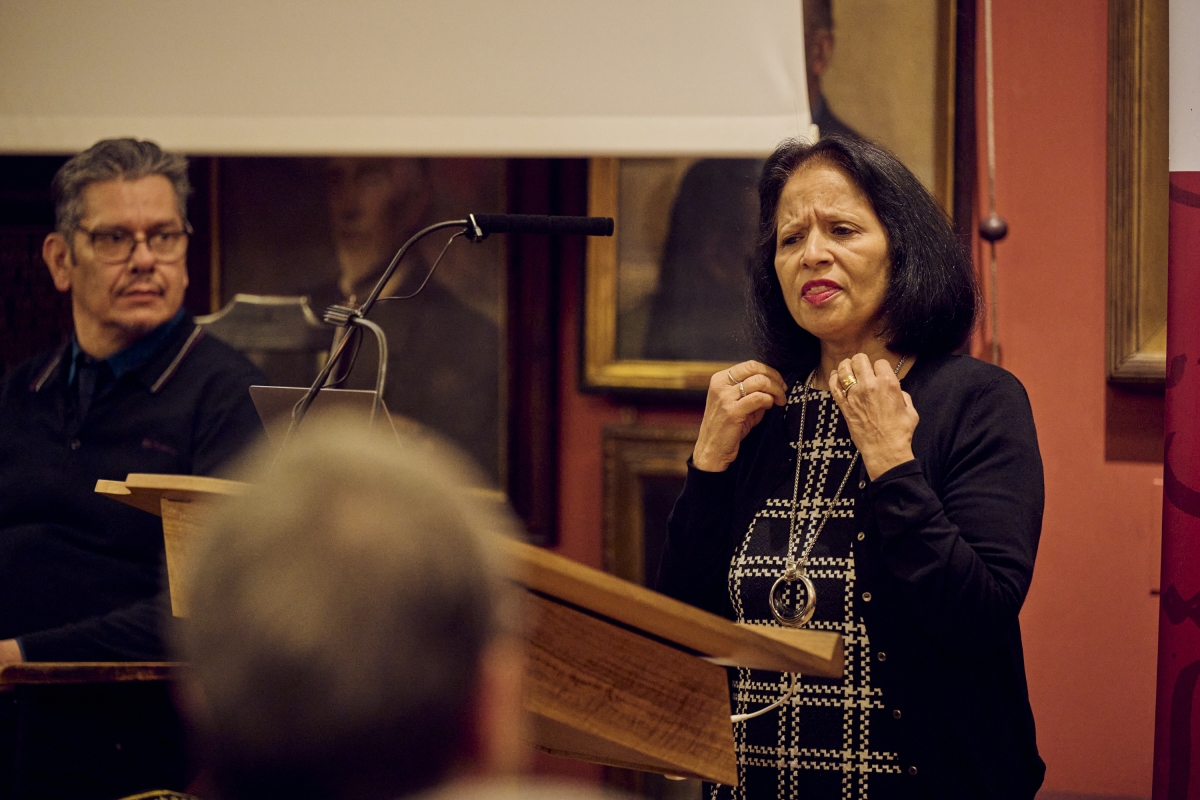
I would first of all like to say thank you to CM and to Zia, Maha, Zaid and Zain, for allowing me to come tonight to say a few words. Where do I start? You've heard the names given by Zia and the family: Begum, Jaan, Dhulan. My name for Saliha was ‘Bestie’. She loved when I called her bestie, she is irreplaceable. She was a pure soul. In this world, if you started counting, I think not even one hand you can find people of a pure soul, she came to this earth with this pure soul, she left a pure soul.
What was important to her was her family, her extended family, her friends, her work. Her life started with her family; her life ended with her family. Everything was about other people. She never, ever thought about herself. Nothing was more important than other people, family. Her hospitality was absolutely out of this world.
Her house in Colindale was the meeting point. She was like a magnet. Everybody attracted to her, including me. But the best thing about her was she never saw anything negative about anyone. always positive. She had empathy. She had sympathy. She was loving. She was caring. She could never ever say no to anyone. If you asked her to say, can you do this? She'll do it. The disabled children at her school, when they saw Saliha, their eyes lit up. She had so much love for those children.
Our friendship was not just as sisters. We were soul sisters. Saliha used to say in our last life we must have been sisters, or mother and daughter. We have that connection. We used to say in next life we'll be sisters again and have another bond and another life somewhere.
She's left a big vacuum in my life, in everybody's life. Let's keep to her legacy because she gave so much to everybody. You can't find a better human being than her. If we took one percent of who she was this would be a much, much better world and much more peaceful, happy world, which we all want. We love you Saliha.
Following Indu Kalaria, Jordi Serra, the Deputy Director of the Centre for Postnormal Policy and Futures Studies spoke.
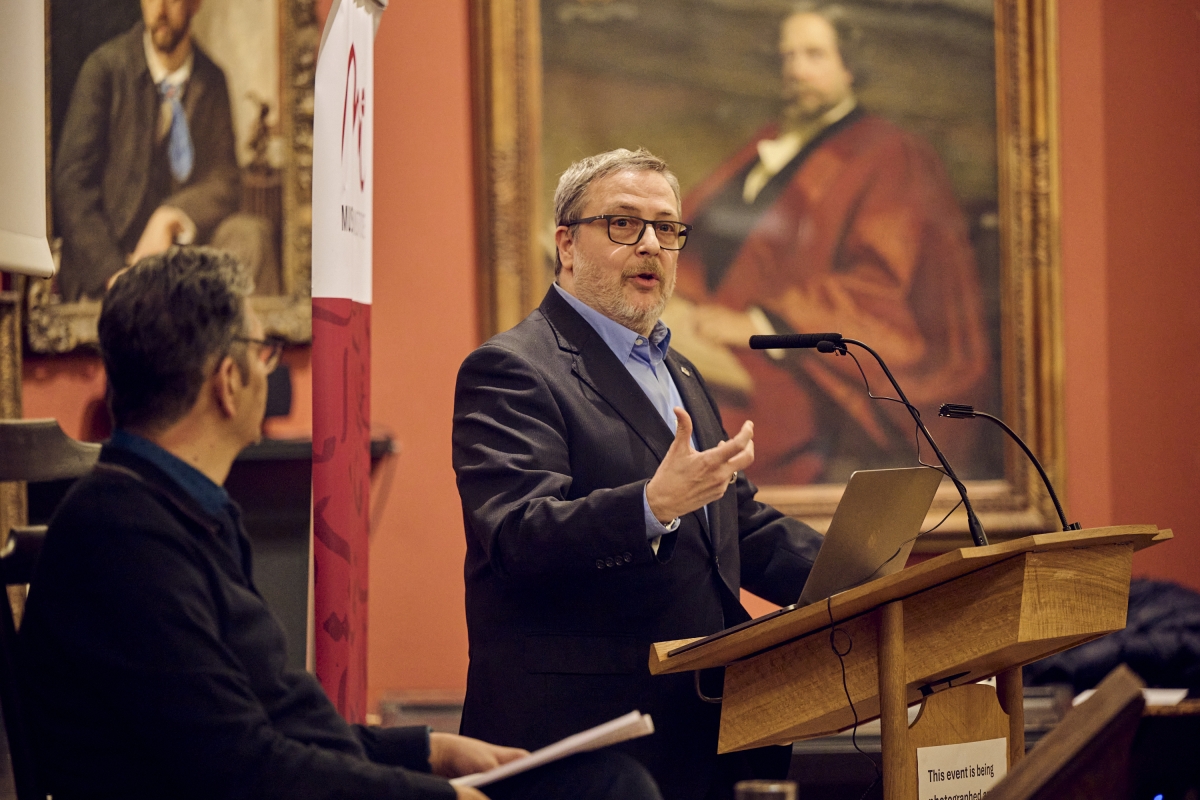
I'm here because Saliha was family. Don’t bother looking for physical resemblance, I am adopted. I am part of this other family. You see, roughly thirty years ago, Zia decided to adopt me as his younger brother. At the time I was a young, fresh futurist trying to start my professional career, Zia was already a well-known, highly respected futurist. So, he adopting me was something very big for me, particularly because I'm an only child.
But to be honest, I didn't know what to make of it. For all I knew this brother thing could be just an Asian way to be polite. So, for a while, I was cautious. I didn't want to overstep, I didn’t know how much truth was in that, until I met Saliha. The moment I went to their place, and she welcomed me, she made me feel like family. I can only agree with what my predecessors have said, she had that way, not with big grandstanding, a statement, but by being very affectionate. But she had that quality to make you feel that she cared for you. She made me feel like family. And I know, especially because of the cooking.
For a while I was traveling frequently to London. Most times I would be flying with an afternoon or early evening flight, I could be arriving at their place quite late. Every single time as soon as I would cross the doorway Saliha would go to the kitchen and finish a meal for me. Sometimes she would say no, no, it's just leftovers. She wanted to make sure that I would get a nice warm home-cooked meal, that kind of meal that you only do for the people that you care about. So that made me feel like family. Because for me cooking is one of the purest and most sincere ways to show love to someone.
And here we are all today celebrating her memory. Initially, the pain of the absence is like an open wound. It's difficult to cope with. But eventually, we remember that as long as we remember them, as long as we keep them in our heart, they will be always with us.
Forgive me if I'm overstepping, but I'm not sure I can help but wonder if Saliha would be completely comfortable with this kind of event. Because we are emphasising how remarkable she was the extraordinary achievements she made. And don't get me wrong. I'm not saying in any sense that she was not remarkable. But I can hardly think of a person with a greater tendency for modesty. She didn't need to be extraordinary. She was quite alright with being ‘ordinary’. She found a way to be ordinary in the most extraordinary manner.
Following Jordi Serra, we returned to a reading from CM48. Celebrated columnist, Yasmin Alibhai-Brown, one of the best journalists and columnists in Britain, read from her essay, ‘My Mother’.
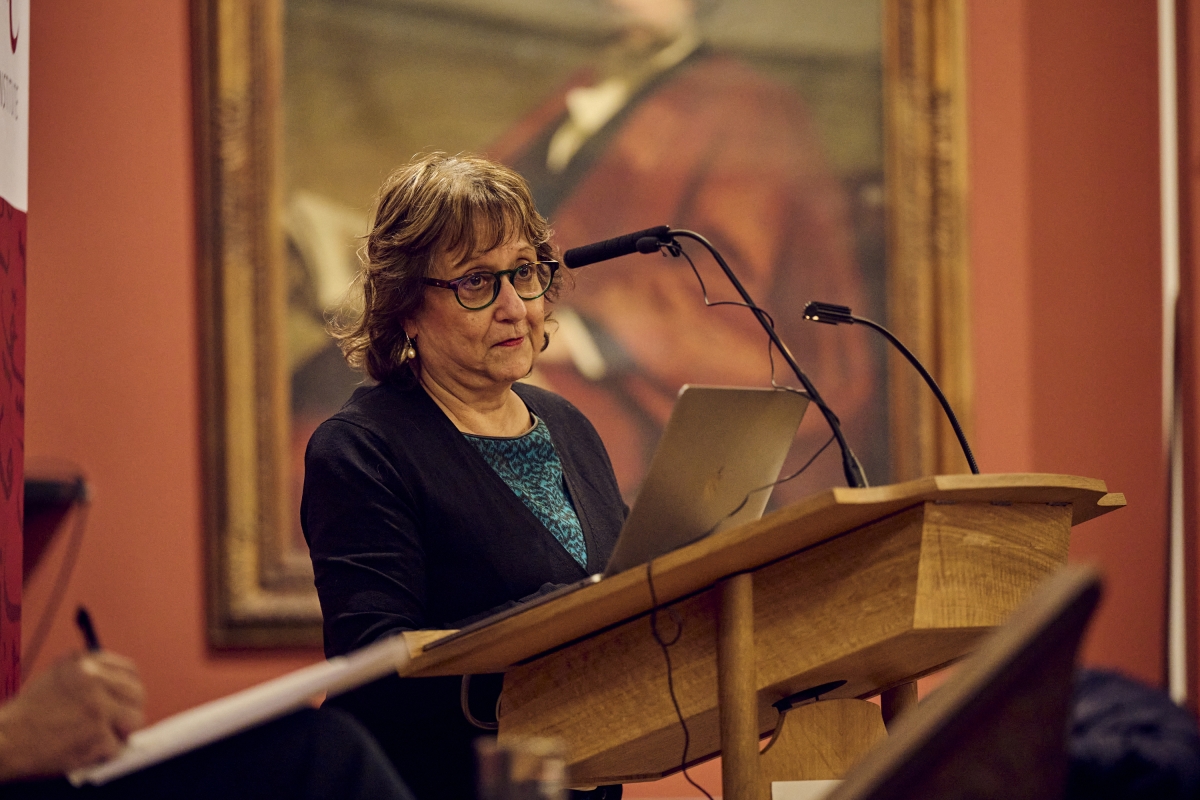
You've all said everything that needs to be said about Saliha. But you didn't say a couple of things. You didn't say that when Zia was being pompous, and loud, as he sometimes does, she would always puncture that balloon, and not let him get away with it.
And the other thing, she was so funny, she really was a very funny woman, she could make you laugh. I think sometimes we're describing all the extraordinary qualities you forget that she was a sparky feisty woman who knew exactly who she was, and what her place was in the world.
And I was just thinking about the link between my mother and Saliha. My father was a bit like Zia quite a lot. Which is why Zia and I fight all the time. The thing was, he was very intellectual. He was brilliant, but he really never cared at all about his wife or his children. That was the difference between the two. Zia cared a lot for is wife and his children. As he describes it and has written in his essay. It's so beautiful. And I sometimes wish my mother had known that kind of love that Saliha absolutely deserved to know. I read:
My mother Jena, was a devout, highly intelligent and independent minded Muslim woman. She was made to leave school at fifteen and lived a tough life without losing her bearings or surrendering totally to misogynist traditions or patriarchal pressures. The word for virtue, in Gujarati and Kutchi, my home languages, is satuguna, meaning good, pure, Excellent, eminent. To her, satuguna was goodness but goodness that was active, personal, internally interrogated, difficult at times, and justifiable. Perpetual resistance to bad customs was good. Thinking for oneself was good. Being kind and generous were good. But goodness had to be subject to tests. She endlessly interrogated her own actions and those of others, setting high bars for both.
Back in Uganda, our old homeland, after giving money to a beggar, she would question herself. Was that just an easy way to self-gratification? Why hadn’t she asked the man about his life? Or bought him a blanket? After moving to London in 1972 and until she died at the age of eighty-two, Jena donated some pounds from her supplementary pension to the Oxfam shop near her because she had known penury and endured its corrosive effects on the body, mind, and soul. A picture of Bob Geldof was up on a wall in her little sitting room. This white pop singer, believed my mum, was a demigod of virtue because he cared about starving Africans. We disagreed about that.
I remember how hard Jena worked when I was growing up. My father, Kassam, was brilliant but irresponsible. She did three jobs to support her son and two daughters but resisted praise: ‘All mothers, even dog mothers, do what they have to for their young ones. Nothing special’. Kassam did not let her wear make up. She acquiesced. But when he tried to stop me wearing lipstick as a teenager, she became a tigress and sided with me: ‘ I did it to make you happy. It was my choice. You were thirty-three, I, a much younger wife. I knew that made you anxious and jealous. But you do not have the right to make my daughter obey you.’ And, although she gave up lipstick, rouge and kohl after her wedding day, she wore so much alluring perfume that market traders used to call her ‘mama attar’.
Subversion, in her book, was, at times, the way good prevailed over tyranny. Such women are the unrecognised caretakers of human dignity and integrity the world over. As George Elliot wrote about Dorothea, the heroine of Middlemarch: ‘the effect of her being on those around her was incalculably diffusive: for the growing good of the world is partly dependent on unhistoric acts; and that things are not so ill with you and me as they might have been, is half owing to the number who lived faithfully a hidden life, and rest in unvisited tombs.’
My mother had a good heart, but she never behaved as if she was better than others. And this still reminds me of Saliha. She was never she never she never showed off.
That brings us neatly to communal, religious, societal, and national virtue upholders. They do what they do to guilt trip and exert authority over other humans. Most are manifestly wicked and/or control freaks and live by the dictum, ‘Do as I say, not as I do’. The religious/community squad co-opt God to grab power. (Jena loathed their hypocrisies and control freakery). Close behind them are patriots and politicians.
My wise and brave mother openly challenged the precepts and enforcers. Only five foot tall, her hair in a bun, wrapped in simple saris, she would argue on the mosque steps with male proselytisers and ‘leaders’. She was with a small band of insubordinate ladies who, one Friday, walked proudly into the mosque with their heads uncovered. This was sometime in the early 1940s.
The keepers of the faith and their obedient worshippers were aghast. The rebel women took them on: ‘Who are you to tell us what to wear?’ ‘God made us. Why should we hide that face, that hair, those arms?’ ‘Oh, so we have to be modest because you men cannot control your needs?’.
I was born later, but I've heard so much about my mother in this group of women who defied them all. These women who are more virtuous than the men who think they have the right to guard the entrance to heaven.
I read on:
I grappled with these questions, how can we become more virtuous? Can virtue be developed or strengthened? If Jenna were alive today, who wonder how she I would explain to that pernicious new Liberal insult, virtue signalling, would even understand how virtue was turned into a sin by those who never possessed it and never understood it?
My good mother, generous to a fault, she believed that the nastiest person could turn into a good, caring citizen, if gently led in that direction. Many remember her today as the woman who helped them understand what goodness really was. And I dedicate this to Saliha, the lady with the smile, as everybody has said.
Following Yasmin Alibhai-Brown’s reading, Amer Farhan Ahmed Nasri, who's a family friend and neighbour of the Sardars, offered a dua to close the memorial and said a few words:
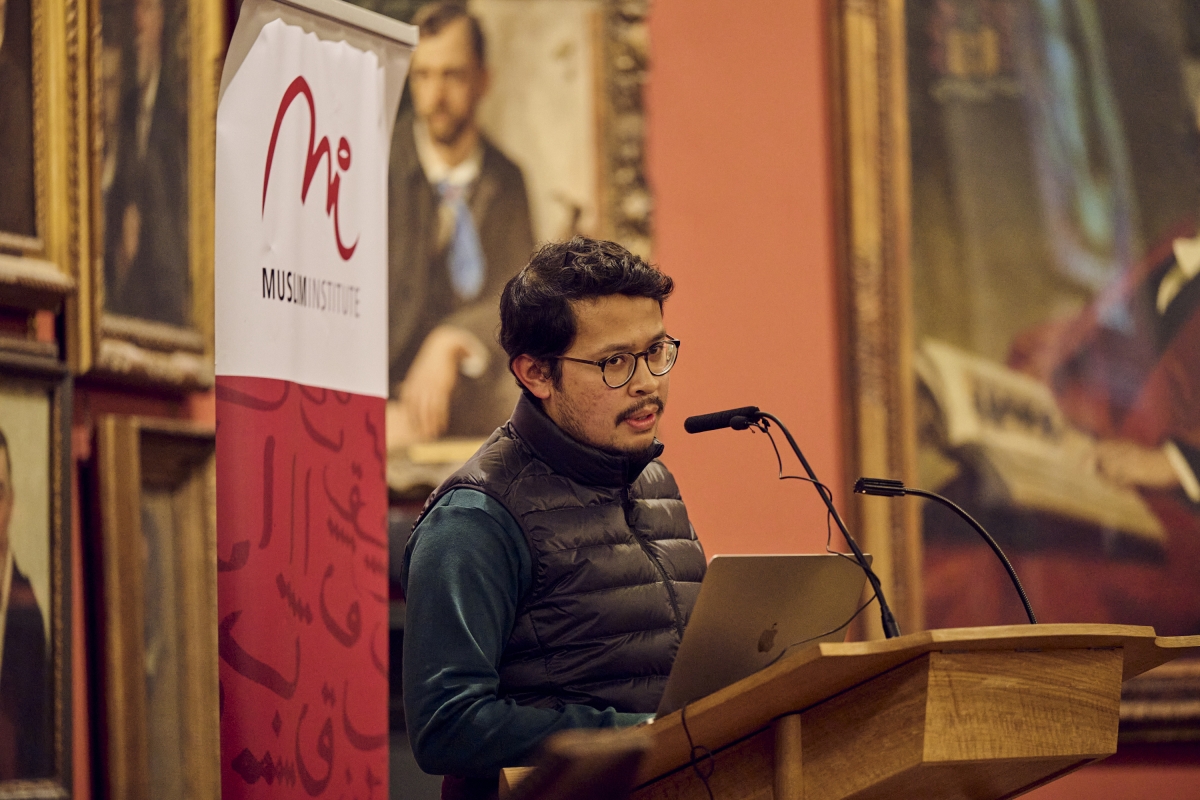
I too lost my mother, under similar circumstances. And like, Auntie Saliha, my mother was also returned to God Most High, we felt at a time and until now, too soon. They both embody the qualities of grace, of patience of selflessness. They were both teachers. And like my mother, Auntie Saliha was never one to take the limelight.
They leave a vacuum that can never be filled. And when I reflect on the loss of the gems that are auntie Saliha and my late mother, there, the thing that I reflect on is that maybe the sorrow that we feel when our earthly angels that are our mothers leave us, the sorrow must not make us make us immobile and it must not make us despondent. Rather sorrow must move us. It must move us to embody the qualities that they have.
Another quality that I would like to point to is this a sense of radical neighbourliness that sets them apart from other people. They were so friendly and so compassionate and accommodating to those who could do them no favour in return.
I pray that each and every one of us will embody the same radical neighbourliness, compassion and gentleness, that our mothers, and Auntie Saliha, embodied in her life. And I hope the messages that have been shared this evening reverberate in every action and interaction that we share from this moment onwards. Thank you very much.
The memorial was closed by Hassan Mahamdallie giving the floor to Asim Siddiqui, deputy chair of the Muslim Institute to say a few words:
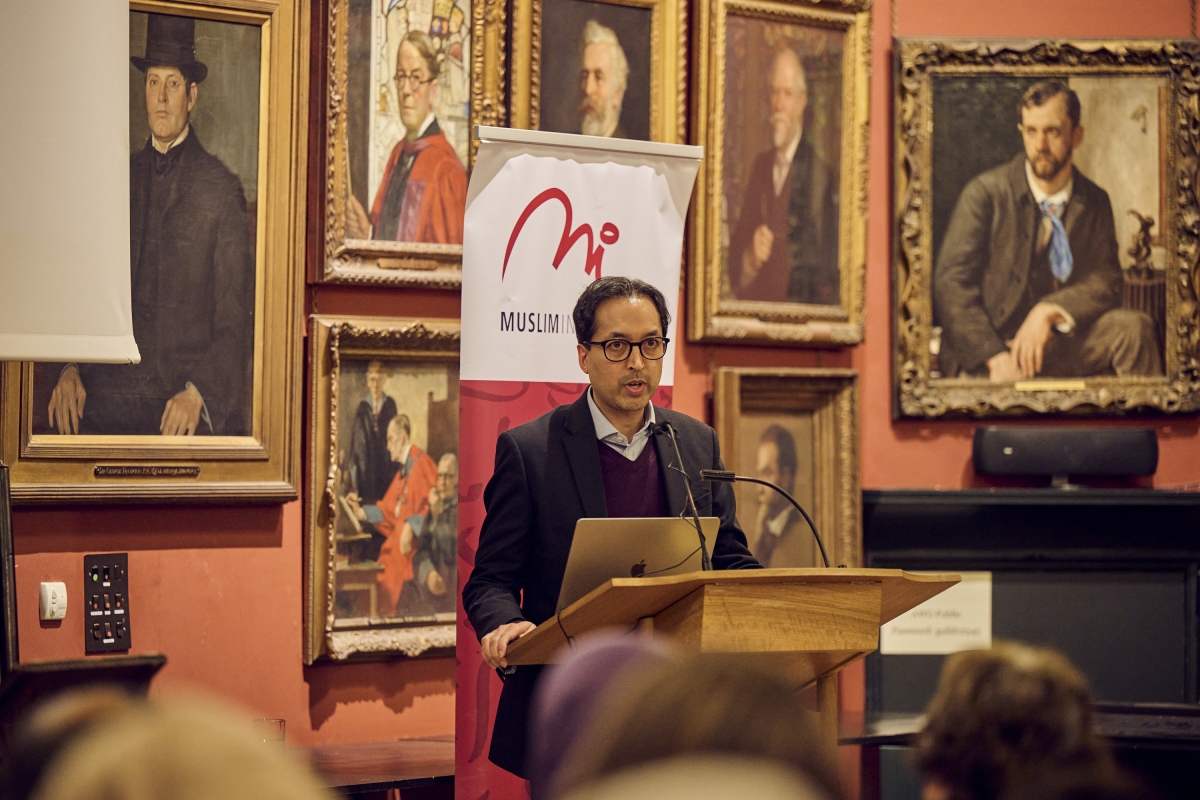
I would like to extend an immense, heartfelt appreciation to you all for coming out for this memorial event. Saliha Auntie was a pillar of love and stability, not just for her family, but also this organization. This community, which in its own way is a large family. Having been such a joyful part of many of our lives, her memory will continually be evoked every time the name of the Muslim Institute is mentioned. Following in this spirit, I'm happy to be able to announce three initiatives:
First, I'm honoured to announce the formation of a new charity. The Saliha Trust for Special Needs Children. This trust will work to support children and those schools and organizations that provide support and welfare to special needs children in the northwest of London. This is where Saliha and her family had made their home for many decades. In that time, Saliha Auntie made a profound impact working as a teacher for special needs children for some 35 years. The charity will purchase equipment such as wheelchairs, and pay for much-needed services or therapies required of those it helps, many of whom come from families who are struggling to cope, as well as those from refugee backgrounds.
Zaid Sardar will be the chair of the trust. Maha Sardar and Zain Sardar will join him as trustees. Other trustees include Indu Kalaria, Nighat Malik, Glaucia Pereira Sousa Andrade and Anna Aronowska. I wish them all the best of luck in this important area of work.
I am also pleased to announce that the Muslim Institute will be offering workshops and seminars future studies and post normal times theory, a concept developed by Ziauddin Sardar, Saliha’s husband. Shenaz Bunglawala, who has recently joined us as a new trustee of the Muslim Institute, will champion this initiative. These seminars and workshops will help young activists and thinkers to develop the tools required to shape their futures.
The third initiative will be the inaugural annual Ibn Sina lectures held in Leeds from this year. As many of you will know the Muslim Institute as a learned society has been holding annual Ibn Rushd lectures for over a decade, in this very hall. We now wish to expand these lectures to the north in the name of Ibn Sina, another intellectual giant of the golden age of Islam known in the West as Avicenna. The inaugural Ibn Sina lecture will take place in April.
I thank you all for taking the time to be with us this evening to remember someone very special to us all.
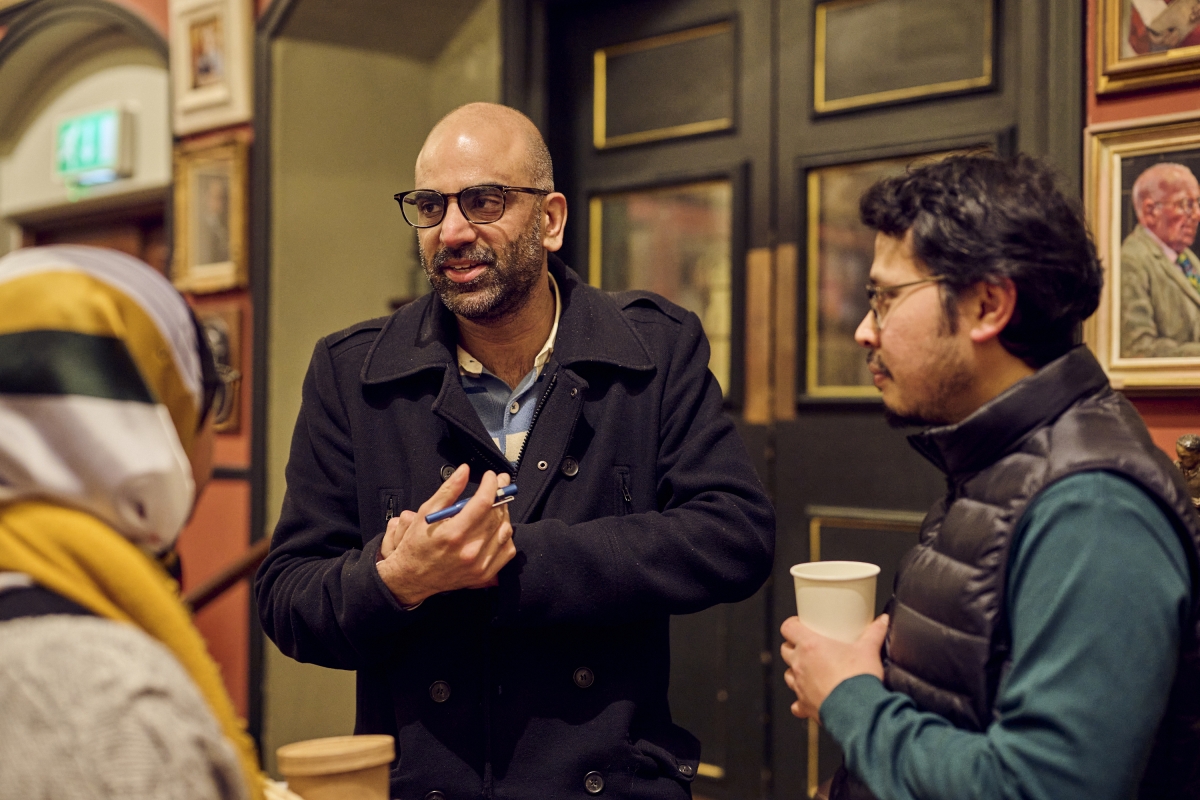
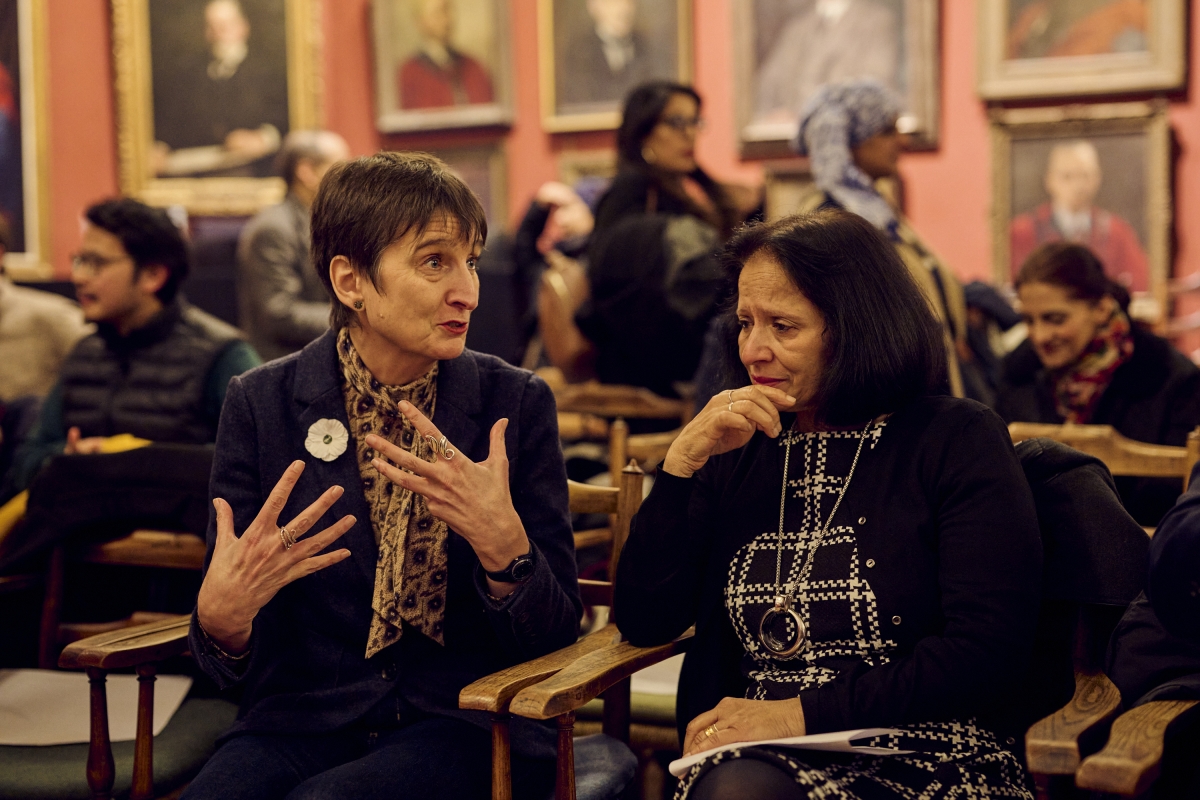
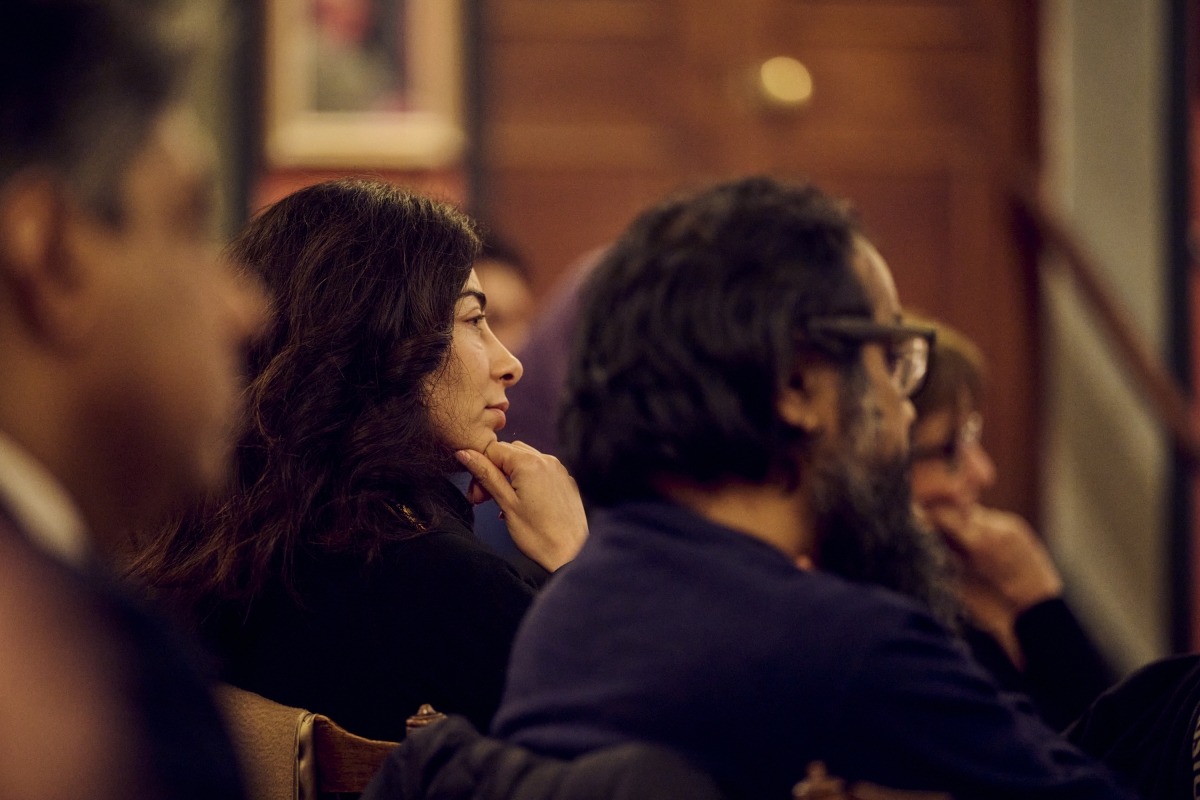
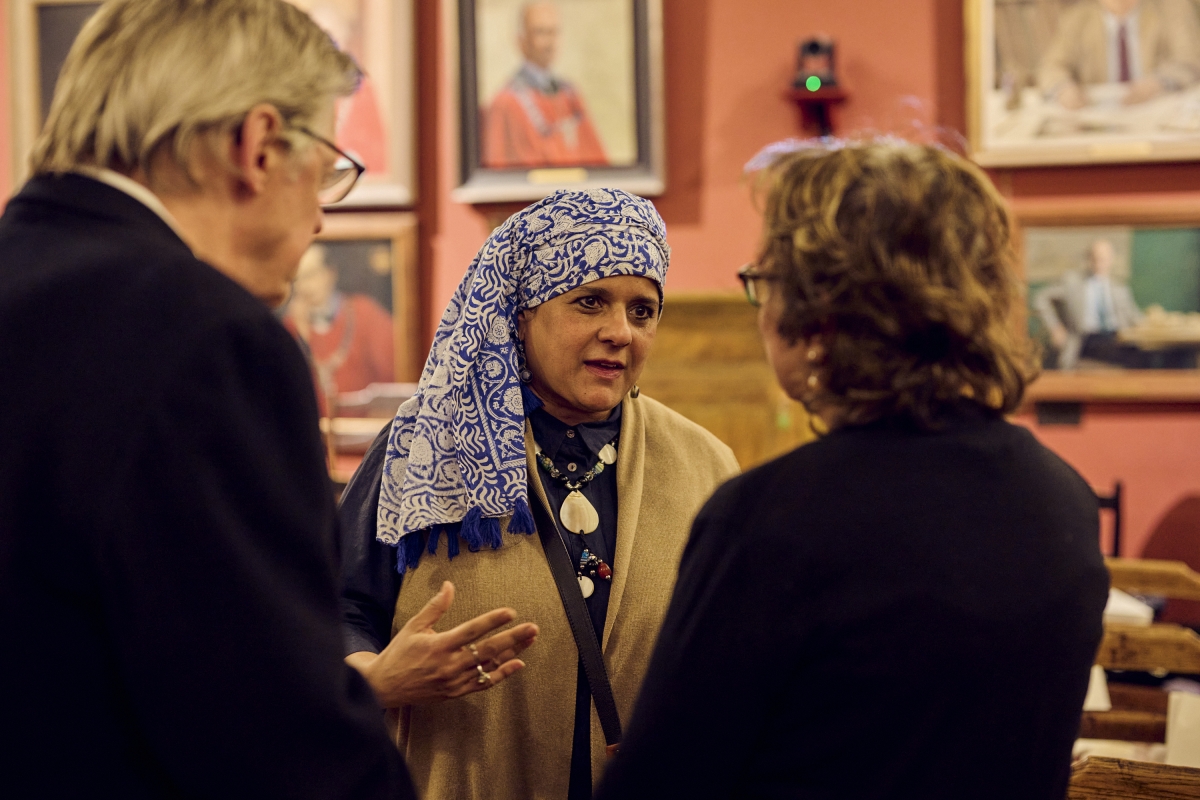
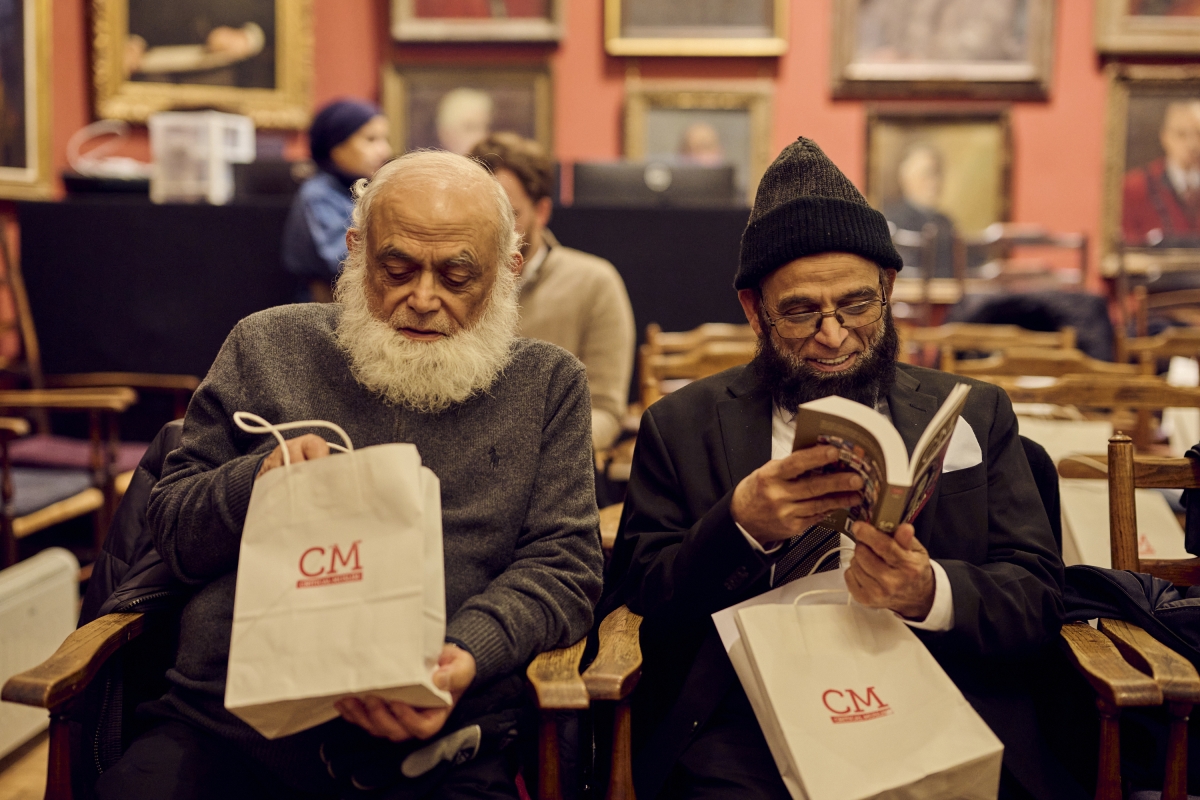
Photos by Khalid Bari
Video by Robert Hoang
Art work by Zafar Malik
Critical Muslim 48: Saliha is dedicated to the memory of Saliha Sardar, who died suddenly in January 2023. The Qur’anic term ‘Saliha’ signifies a person who is virtuous, righteous, pious and unfailingly does good deed; and this issue explores virtues from a number of different perspectives. From the virtues of the Prophet to the virtues of knowledge and old age, from the virtuous life of Saliha to the virtuous life of Shuhada Sadaqat (Sinead O’Connor), from bedrock virtues needed to save the planet to the ways Confucius shows how to live a virtuous life, rom devoted mothers to the importance of balanced anger, to critique of virtues generated by ChatGPT.
Download an exclusive essay from CM 48: My Dinner With Saliha by C Scott Jordan.

